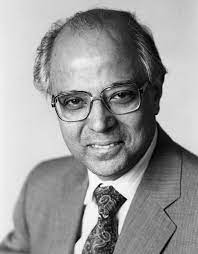by Elizabeth Reid
*Featured image: Lewis Perinbam, 1987 (Source: Unknown photographer/LAC e999919839-u).
Public history is about taking history beyond the traditional academic setting and applying it to real-world challenges. It is history that is aimed at being accessible to the public. This is exactly what Anna Kozlova, a PhD Candidate at the Department of History at Carleton University, has been doing over the past several months in her MITACS-funded research project “Two case studies in the public history of international development policies in Canada: the Lebanese Special Measures Program (1975-1990) and The Life of Lewis Perinbam (1925-2008)”.
Anna is focusing on aspects of international development and humanitarian history in Canada that have previously been overlooked. The project is a partnership with the World University Service of Canada (WUSC) and the Canadian Immigration Historical Society (CIHS) and is supervised by Dr. Dominique Marshall at the Department of History at Carleton University. WUSC is a Canadian non-profit organization focused on making education more accessible to youth around the world and CIHS is a non-partisan organization that promotes interest in Canadian immigration, refugee matters and history. The two NGOs provided funding to the project which was matched by MITACS through a MITACS Accelerate grant. The areas of focus for this project are the Lebanese Special Measures Program, which was created as a means for Canada to support individuals who were affected by the civil war in Lebanon, and Lewis Perinbam – a Canadian civil servant whose work had a profound effect on Canada’s international development policies.
Lewis Perinbam had a significant impact on Canada’s relationship with the Global South throughout his decades-long career. He started his career with WUSC going on to work in the field of international development with the Canadian government through the Canadian International Development Agency’s (CIDA) NGO program as well as with multiple NGOs such as the Canadian University Service Overseas. Currently, his legacy is marked by WUSC’s Lewis Perinbam Award for International Development which is awarded to those who have made an important contribution to development efforts abroad. For this portion of the project, Anna is creating a biography of Lewis Perinbam in order to showcase the impact his career had on Canada’s international development policy. This project is focused on oral history interviews conducted with Perinbam’s family, acquaintances and former colleagues, the final results of which will be displayed in an interactive website that will feature highlights from his accomplishments.
For her work with CIHS, Anna is working with archival materials that are held at Library and Archives of Canada in order to put together a detailed chronology of the Lebanese Special Measures Program. The Lebanese Special Measures Program was launched in Canada in response to the civil strife that took place in Lebanon between 1975-1990 in order to aid those impacted by the conflict. The Program helped to bring 30,000 individuals from Lebanon to Canada. This program had a significant effect on Canada as it resulted in changes to the way Canada responded to international crises as well as leading to a shift in Canada’s domestic landscape through the strengthening of its local Lebanese diaspora.
The goal of this project is to explore important points in Canada’s history of migration and international development that are currently not very well-documented in order to ensure that this history can be accessible by future generations.
Elizabeth Reid is a fourth-year student in History at Carleton University, where she worked as an undergraduate Research Assistant under the I-CUREUS program in 2020-21. Elizabeth assisted two projects: this one under the supervision of doctoral candidates in History Anna Kozlova and another similar endeavour under the supervision of doctoral candidate Helen Kennedy. This was done with advice from Dominique Marshall, from the Department of History at Carleton University, coordinator with CNHH, and Chris Trainor, head of Archives & Special Collections at Carleton University. Previously, she completed a practicum placement with WUSC about which she wrote one blog in these pages.





